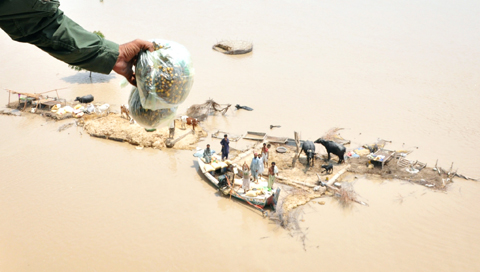The UN is launching an appeal to help 13.8 million people hit by one of the world’s worst humanitarian disasters after floods paralyzed parts of Pakistan and raised fears of disease.
The UN Office for the Coordination of Humanitarian Affairs said the disaster had eclipsed the scale of the devastating 2004 Indian Ocean tsunami, the 2005 earthquake in Pakistan and January’s earthquake in Haiti put together.
About 1.5 million people have been evacuated in the south and 1.5 million hectares of valuable farmland destroyed in central Punjab Province while the worst hit has been the northwest, already struggling with Taliban violence.

PHOTO: REUTERS
“We will soon issue an … appeal for several hundred million dollars to respond to immediate needs,” UN Secretary-General Ban Ki-moon said.
The Pakistani government and UN officials have appealed for more urgent relief efforts to cope with the catastrophe, saying that billions of dollars will be needed to restore livelihoods and rebuild infrastructure.
Parts of the Swat Valley were still cut off yesterday by road as were parts of the country’s breadbasket in Punjab and Sindh.
“This is a major disaster of enormous magnitude,” UN emergency relief coordinator John Holmes said. “Needs are huge and still rising. The humanitarian effort needs to be scaled up accordingly, as fast as we can.”
Weather cleared yesterday, allowing 23 Pakistani, six US military and four Afghan helicopters to help distribute relief items and rescue people stranded in the northwest, one military official said.
The world body estimates 1,600 people have died in Pakistan’s floods and the Pakistani government has confirmed 1,243 deaths.
In the south, there are warnings in towns and cities for people to remain on alert, but water levels were beginning to drop at the Guddu barrage and the meteorological office has forecast scattered rain in the next 24 hours.
Ban also stressed the need to consider medium- and long-term assistance to Pakistan, warning that this “will be a major and protracted task.”
Food prices are skyrocketing, compounding the misery as the floods ravage the country’s most fertile lands and wipe out crops.
The UN said donors have already provided US$38.2 million while a further US$90.9 million has been promised, but on the ground Islamic charities with suspected extremist links have been far more visible in the relief effort.
Meanwhile, Pakistani President Asif Ali Zardari returned to Pakistan yesterday, where he faced a storm of criticism for visiting Europe as his country was gripped by its worst natural disaster.
The timing of the trip struck a raw nerve among many who said he should have stayed with his suffering people — even though Zardari, fearful of assassination, rarely makes public appearances in Pakistan anyway. The criticism was particularly harsh after reports that he’d visited his family’s chateau in France.
Zardari returned to Karachi and was expected back in Islamabad today. He was set to meet with the chief ministers of the provinces to map out a rehabilitation program, said a spokeswoman for the ruling Pakistan People’s Party said.
Also See: Summer of extreme weather fuels debate over warming

Former Nicaraguan president Violeta Chamorro, who brought peace to Nicaragua after years of war and was the first woman elected president in the Americas, died on Saturday at the age of 95, her family said. Chamorro, who ruled the poor Central American country from 1990 to 1997, “died in peace, surrounded by the affection and love of her children,” said a statement issued by her four children. As president, Chamorro ended a civil war that had raged for much of the 1980s as US-backed rebels known as the “Contras” fought the leftist Sandinista government. That conflict made Nicaragua one of

BOMBARDMENT: Moscow sent more than 440 drones and 32 missiles, Volodymyr Zelenskiy said, in ‘one of the most terrifying strikes’ on the capital in recent months A nighttime Russian missile and drone bombardment of Ukraine killed at least 15 people and injured 116 while they slept in their homes, local officials said yesterday, with the main barrage centering on the capital, Kyiv. Kyiv City Military Administration head Tymur Tkachenko said 14 people were killed and 99 were injured as explosions echoed across the city for hours during the night. The bombardment demolished a nine-story residential building, destroying dozens of apartments. Emergency workers were at the scene to rescue people from under the rubble. Russia flung more than 440 drones and 32 missiles at Ukraine, Ukrainian President Volodymyr Zelenskiy

COMPETITION: The US and Russia make up about 90 percent of the world stockpile and are adding new versions, while China’s nuclear force is steadily rising, SIPRI said Most of the world’s nuclear-armed states continued to modernize their arsenals last year, setting the stage for a new nuclear arms race, the Stockholm International Peace Research Institute (SIPRI) said yesterday. Nuclear powers including the US and Russia — which account for about 90 percent of the world’s stockpile — had spent time last year “upgrading existing weapons and adding newer versions,” researchers said. Since the end of the Cold War, old warheads have generally been dismantled quicker than new ones have been deployed, resulting in a decrease in the overall number of warheads. However, SIPRI said that the trend was likely

‘SHORTSIGHTED’: Using aid as leverage is punitive, would not be regarded well among Pacific Island nations and would further open the door for China, an academic said New Zealand has suspended millions of dollars in budget funding to the Cook Islands, it said yesterday, as the relationship between the two constitutionally linked countries continues to deteriorate amid the island group’s deepening ties with China. A spokesperson for New Zealand Minister of Foreign Affairs Winston Peters said in a statement that New Zealand early this month decided to suspend payment of NZ$18.2 million (US$11 million) in core sector support funding for this year and next year as it “relies on a high trust bilateral relationship.” New Zealand and Australia have become increasingly cautious about China’s growing presence in the Pacific